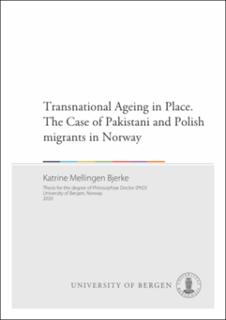| dc.description.abstract | This thesis combines the research field of social gerontology and the field of migration research to explore the experiences of “ageing in place” among Pakistani and Polish migrants in Norway. In the social gerontological usage the concept of ageing in place refers to a set of ideals and ageing policies based on the premise that older people would prefer to stay in their home environments for as long as possible. In migration research the concept refers to the fact that most of the labour migrants and refugees who traveled to northern European countries – including Norway – after World War Two (WW2) are growing old in the destination country of migration. Hence, they are ageing in place in these destination countries.
The study constitutes a comparative biographical case study, based on biographical interviews and participant observation. Pakistani and Polish migrants were chosen because I wanted to compare the experiences of ageing in Norway among migrants from a country within and from a country outside of Europe. Although there is wide agreement that non-European migrants are more likely to be vulnerable and disadvantaged than those coming from within Europe, there are hitherto few studies that compare differences and similarities in their experiences. Consequently, this study constitutes an important empirical contribution to scholarship on ageing and migration.
The thesis adopts a multidimensional approach whereby experiences of ageing in place is explored through the lens of three theoretical perspectives: A life course perspective; a transnational perspective; and an intersectionality perspective. Firstly, the life course perspective draws attention to how experiences of ageing as a migrant are shaped by forces operating at the macro, meso and micro level. At the macro level, this includes considering the social, economic, and cultural contexts which shapes the lives of older migrants. At the meso level, experiences of ageing in place is examined in relation to community formations, and in relation to family and kin. At the micro level, the experience of ageing in place is analysed in relation to the migrants’ individual life course experiences. Secondly, the transnational perspective serves to highlight migrants’ ties to their countries of origin as these are biographically articulated, through migrants having spent parts of their lives in a different national context, as well as through their continuing transnational ties. Thirdly, the intersectionality perspective illuminates how inequality dimensions such as gender, ethnic background and class intersect in shaping older migrants’ experiences of ageing in place in different ways.
In a transnational context, migrants live their lives in-between two different – sometimes contradictory – socio-political, structural, and cultural contexts which shapes their experiences of ageing in place. In the thesis, I explore this in relation to three dimensions: Firstly, I examine how migrants negotiate cultural expectations of family care and support. Secondly, I explore their experiences of ageing in place in relation to their incorporation in a formal support system, including their relation to the Norwegian welfare state. Thirdly, I explore their social embeddedness in Norway and the meanings of this social embeddedness for their sense of identity and belonging.
The study finds that Pakistani older migrants have stronger cultural expectations of family care than the Polish older migrants. These cultural expectations are collectively shared and upheld in the Pakistani migrant community in Norway. Polish older migrants do not have similar expectations and would rather make use of formal care services to protect their loving and affectionate family relationship. Norway promotes an ideal of dual earner/ dual carer families. This shapes the capacity of adult children to provide care for older family member. Thus, Pakistani older migrants must negotiate cultural expectations of family care in a context where adult children might not be able to take on full responsibility for care provision.
Another important finding of the thesis is that both the Pakistani and Polish older migrants have developed an intimate familiarity with the Norwegian welfare state and place a great deal of trust that the welfare state will be there in times of need. This intimate familiarity may be understood with regards to the relative resourcefulness of the migrants interviewed, and the relatively universal provision of welfare benefits and services in Norway. Moreover, incorporation in the Norwegian health care system shapes their transnational mobility patterns – when to travel and for how long. However, while the Polish older migrants have access to a health care system in both Poland and Norway, due to membership in the European Union, Pakistani migrants do not have similar access to a health care system in Pakistan as they do in Norway. This means that for the Pakistani older migrants, incorporation in the Norwegian health care system is more important and shapes their transnational mobility patterns.
Combined, these dimensions put the Pakistani older migrants at greater risk of being vulnerable and disadvantaged than the Polish migrants. However, through the analysis I show that most of the Pakistani older migrants find ways to reconcile cultural expectations and normative behaviours from Pakistan, with the structural, cultural, and institutional demands of the Norwegian context. Moreover, Pakistani older migrants have developed a vibrant ethnic and religious community which serves to provide a buffer against some vulnerabilities, particularly feelings of loneliness and boredom. Because of norms of gender segregation in the Pakistani migrant community it is mostly Pakistani men who attend social gatherings in the public sphere – such as the mosque and ethnic community associations – and they do so several days a week. Women are not obliged to attend the mosque, but they often spend an afternoon a week there. The Polish older migrants who live in the larger cities also have strong ties to a religious community but gatherings in these communities occur less frequently. Pakistani men’s frequent attendance in the mosque and gatherings in the ethnic community association indicates that the emotional and social support functions of these gatherings are greater than it is for Pakistani women, and for Polish older migrants in general. | en_US |
